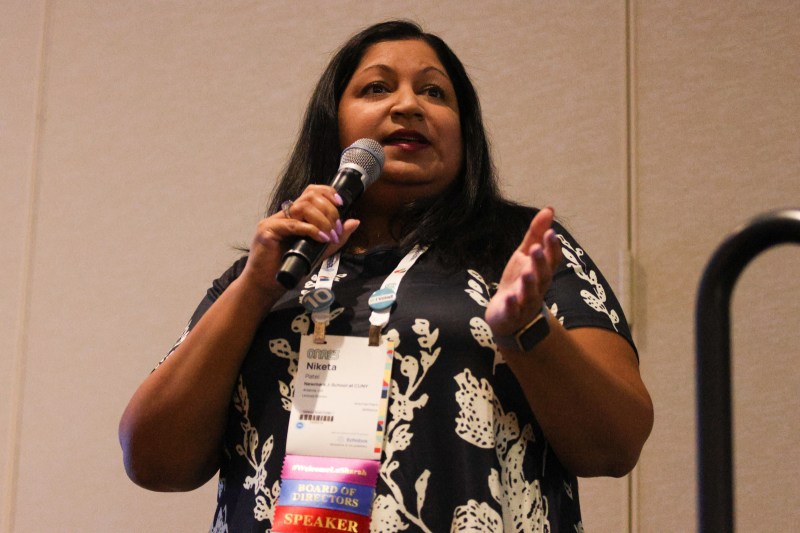Time Management and How it Benefits Journalists
Time management skills are key to journalists’ controlling their time and maintaining their mental health according to the senior director of leadership programs at CUNY, Niketa Patel and Kyle Plantz, a worker at the professional development training programs at CUNY who spoke about time management at the ONA23 conference in Philadelphia.
Patel focused on four ways to improve time management: working smarter not harder, reducing stress, taking time for yourself and having self confidence.
“Obviously, time management helps you work smarter, and not necessarily harder, because that’s a big misconception,” Patel said.
Hard work can be effective, but inefficient.
Time management reduces stress and keeps anxiety at bay, Patel said. If you are mindful about how you’re spending your time, you are less likely to be overwhelmed. Focusing your time and energy on one thing at a time should make you less stressed out.
Taking time off and making space for yourself empowers you to do better in your assignments.
Multitasking generally doesn’t turn out as well as people think, Patel said. Alternatively, taking ownership and valuing your own time leads to giving your time to others like your family and friends. Also, it creates bandwidth to spark creative joy and strategic projects.
Self confidence also reduces stress and you are more likely to be organized and focused on projects in a mindful way, Patel said. Self confidence can also help people feel less overwhelmed and more organized in terms of time management. That helps to make you feel like you’re sort of in control of things and not spiraling up, she said.
“Lord knows I’m guilty of spiraling a lot so I reset and come back to these kinds of beneficial views,” Patel said.
10 tips for managing time
Plantz provided tips for time management
- How you’re spending your time: It can take a while before you understand how important a certain task is.
“I actually ask the people I work with to track their time for just one week to see how long it takes them to complete tasks. For example, are they spending most of their day checking their email for an hour?” Plantz said.
- Assign time limits to your tasks: If there is no set time limit, you can get grounded and only focus on one task. This isn’t productive, efficient or helpful to your health. Instead, block off time from your calendar and spend a shorter amount of time on tasks.
“One hour. I’m going to do this thing and finish it,” Plantz said.
- Create a daily schedule and stick to it: Think about how you’re doing in the moment and find a time to do basic things, like getting lunch. Budget time for what you are going to do in the morning and afternoons.
- Prioritize the most important tasks often and early: At work, Plantz has team meetings to discuss the priorities for the day. He said that every single day, he asks himself what are the big tasks he needs to take care of and what tasks he can push off for tomorrow. He identifies tasks he needs help with and recommends that people should do that at the start of the day.
“This way, it will help you feel calmer and more relaxed and to be able to get your
work done,” according to Plantz.
- Group similar tasks together: If there are multiple tasks that focus on one topic like social media or spreadsheets, you can put those tasks in a group. Then, you work on those tasks individually, stay in one mindset, and not forget anything else.
“Being able to kind of get those together so that you are able to prioritize, helped me stay in the same mindset of completing tasks,” Plantz said.
- Stop multitasking: If you constantly multitask, you are at risk of forgetting to do a task that may be the most important in your life. Instead, sit down and focus on one thing at a time for a certain amount of time and then move onto another task instead of doing them at the same time.
“It helps you prioritize better and helps you stay focused and not feel chaotic and able
to finish tasks on time,” Plantz said.
- Take breaks: This is crucial and there are many ways to take a break. A few examples are grabbing water or lunch, watching television and exercising because it releases endorphins that make us happier and able to make us work better.
“When I take my break, I eat lunch and watch Parks and Rec,” Plantz said. “It’s only 20 minutes long and I find it relaxing.”
- Learning to say no: It can be a struggle for people because they might want to take on every project to show they are capable at their job. However, it can be overwhelming because you have so many things you have to do in a short amount of time. Instead, you have to pass on an opportunity to someone else and explain why you can’t take on the opportunity,” Plantz said. “Being able to understand your workload is really important and saying no, sometimes it’s hard but it is a skill to develop over time.”
- Eliminate distractions: Social media platforms like Facebook or Twitter or text messages on your phone can distract you from work or vital time that you need to concentrate,” Plantz said. “It’s important to be able to eliminate those distractions for the time that you need to complete tasks.”
- Get organized: In order to get organized, you have to know what to prioritize and list them. This will help you know what you need to accomplish tasks effectively.
“I think this is really really important,” Plantz said.
Tools for Organization
Patel conducted an activity where she asked the audience to come up with ideas of how to stay organized. Audience members came up with making to-do lists using apps like Calendar, Slack and Evernote. Others came up with physical to-do lists using post-its and Bullet Journals.
“There’s just so many ways of getting through the day and feeling that sense of accomplishment. You feel like you’ve had a really productive day and so I view that very much as a reward to myself,” Patel said.
These tips and tools for time management connect to the newsroom because staying focused on work can be difficult and easily overwhelming for journalists. If journalists are given many stories to complete, the workload can become stressful and may cause anxiety. Having to complete all your stories by a deadline can be challenging, so having these tricks are crucial to being productive and valuing themselves.






